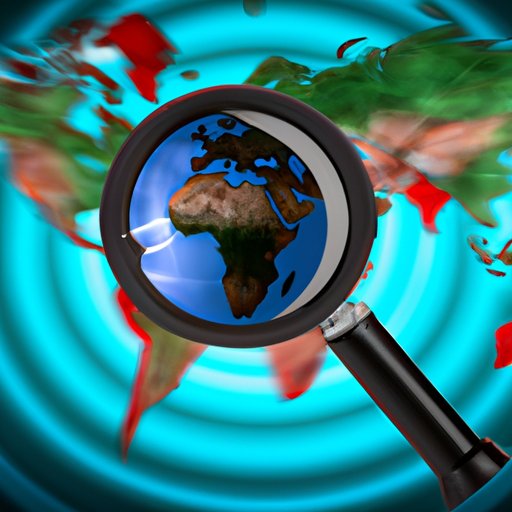I. Introduction
The topic of world wars is one that has been debated for many years. While most people are aware of World War I and II, many are uncertain about how many world wars there have been. In this article, we will explore the history of this conflict, its impact on the modern world, and the potential consequences that a third world war may have on humanity.
II. A Brief History of World War – From Its Beginnings to Modern Day
World War is a term used to describe a global conflict that involves multiple nations and has a significant impact on the world. The two most well-known world wars are World War I and II, which occurred in the early 20th century.
World War I began in 1914 and lasted until 1918. The primary belligerents involved were the Allied Powers, which included France, Great Britain, Russia, and the United States, and the Central Powers, which included Germany, Austria-Hungary, and the Ottoman Empire. The catalyst for the war was the assassination of Archduke Franz Ferdinand of Austria-Hungary. The war was one of the deadliest conflicts in history, resulting in the deaths of millions of soldiers and civilians.
World War II began in 1939 and lasted until 1945. The primary belligerents involved were the Allied Powers, which included the United States, Great Britain, France, and the Soviet Union, and the Axis Powers, which included Germany, Japan, and Italy. The catalyst for the war was the invasion of Poland by Germany. The war resulted in the deaths of over 70 million people and was the deadliest conflict in human history.
III. The Impact of World Wars on the Modern World
The impact of world wars on the modern world is significant and far-reaching. These conflicts have played a vital role in shaping global geopolitics, developing technology and warfare, and promoting human rights and democracy.
World wars played a significant role in globalization, as they created a need for cooperation and unity among nations to prevent future conflicts. This led to the establishment of international organizations like the United Nations and the European Union.
World wars also led to the development of new technologies and advancements in warfare, including the development of nuclear weapons, radar, and computers. These advancements have had a lasting impact on the world and continue to shape our lives today.
Finally, world wars promoted the ideals of human rights and democracy, as many people sacrificed their lives to fight for these values. These conflicts led to the establishment of civil rights and democratic governments in many countries, which has helped to promote peace and stability in the modern world.
IV. 5 Lesser Known World Wars That Shaped the World
While World War I and II are the most well-known world wars, there have been many lesser-known conflicts that still had a significant impact on global geopolitics. These include the Seven Years War, the Napoleonic Wars, the Crimean War, the Russo-Japanese War, and the Cold War.
One of the most significant of these lesser-known world wars is the Cold War, which lasted from the end of World War II until the collapse of the Soviet Union in 1991. The Cold War was a global conflict between the United States and the Soviet Union that was characterized by a nuclear arms race, espionage, and proxy wars. The Cold War had a massive impact on the world and contributed to the development of the post-war world order.
V. The Key Differences Between World War I and World War II
While both World War I and II were global conflicts that had a significant impact on the world, there are several key differences between these two wars.
Firstly, the causes of the two world wars were different. World War I was caused by the complex network of alliances and treaties that existed in Europe at the time, as well as the assassination of Archduke Franz Ferdinand. World War II was caused by the aggressive expansionism of Nazi Germany and the failure of appeasement policies.
Secondly, the primary belligerents involved in the two world wars were different. World War I involved the Allied Powers and the Central Powers, while World War II involved the Allied Powers and the Axis Powers.
Finally, the impact of the two world wars on the world was different. World War I led to the establishment of the League of Nations and the collapse of several empires, while World War II led to the establishment of the United Nations and the division of the world into two superpowers.
VI. What Would Happen if We Had a Third World War?
The prospect of a third world war is one that is difficult to contemplate, but it is something that cannot be ruled out entirely. There are several factors that could contribute to a potential global conflict, including rising tensions between superpowers, terrorism, and the spread of nuclear weapons.
If a third world war were to occur, the consequences would be catastrophic. It would likely result in the deaths of billions of people, the collapse of economies and governments, and the destruction of much of the world’s infrastructure. The impact of a third world war on humanity would be unimaginable, and it is something that must be prevented at all costs.
VII. Conclusion
In conclusion, the topic of world wars is one that is essential for all people to understand. We have explored the history of this conflict, its impact on the modern world, and the potential consequences that a third world war may have on humanity. By understanding these issues, we can work towards preventing future conflicts and promoting peace and stability in the modern world. We call on readers to continue educating themselves on this topic and to be informed global citizens.
